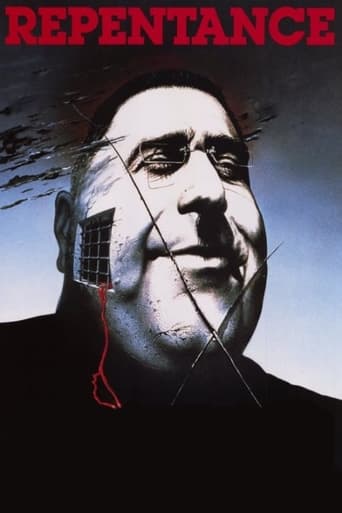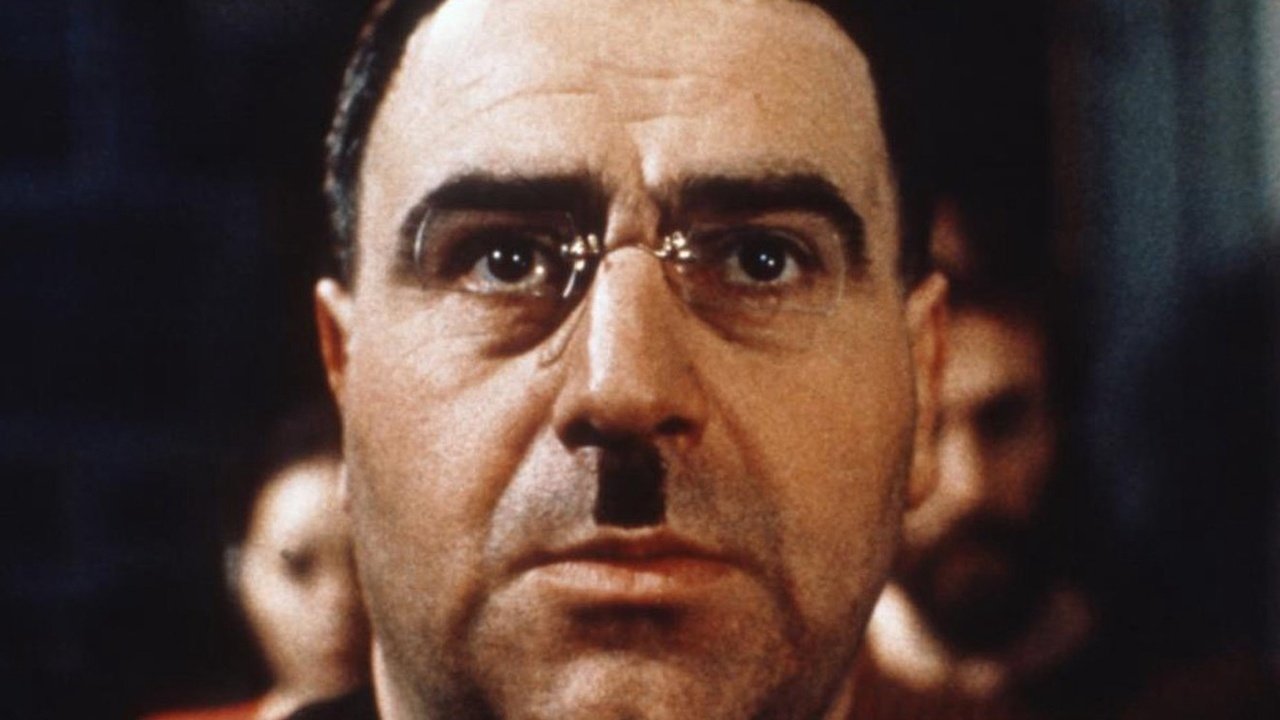adriennenoracarter
Repentance is a film one would expect to come out of Perestroika and Glasnost. It is a Stalinist/early Soviet metaphor that would have never been seen before this time. The story begins in present day, or in this case 1984. In a small Georgian town, the mayor, Varlam Aravidze, dies. The seemingly important citizens of the community come to pay their condolences at his funeral. However, one day after the funeral, the corpse is found at the home of the mayor's son. The corpse is reburied . . . but is removed from the crypt a second and third time. A woman is taken into custody and put on trial. She admits to having done it; much of this part of the film is full of flashbacks focusing on Varlam's terrible reign, revealing her motives for having done it. Varlam looks like a combination of dictators. There are traces of Hitler (the mustache) and Mussolini (the black shirt), but of course he can also be compared to Stalin and Beria, two of the cruelest names known in Soviet history, both who were of Georgian origin. Varlam was the Stalinist figure, and the two other generations of his family could be considered a lot of the rest of Soviet history. His grandson clearly represents the period of Glasnost and Perestroika. He has trouble accepting what his family has done, and he commits suicide because of it (I'm sure it was not meant to be this way, but it could be considered a foreshadowing of the end of the Soviet Union). The son of Varlam is sort of everything in between Stalin and Perestroika (except the anti-Stalin Krushchev years).This was a very interesting movie; it was a little too full of symbolism, but beautifully made. It was a very interesting change watching a Georgian Soviet film instead of a Russian made Soviet film.
pgma14-901-604053
This film was absolute genius and, in my opinion, one of the best films produced in the 20th century. It is on par with films like the Seventh Seal and Schindler's List in terms of symbolism and philosophy. The only way one can not like this film is if one does not understand it- which is quite possible, if one is only haphazardly watching it and is not fully engaged, or is expecting the film to chew up the messages for you and give you something simple you can quickly take away without actually appreciating the movie- then this is the wrong film for you. In order to properly appreciate this film you have to engage in higher philosophical thought and reflect both on the lives of individuals of the Stalinist era as well as your own era, since this movie is timeless. It explores human nature at its basest level, and what causes humans to act in the ways they do.
arsoys
I have to say that my review is based on what I saw in 1990. I was 21....................................The plot is your standard totalitarian nightmare. Let's dispense with it.Everything else is uniquely boring: the symbolism, the surrealism, the open politics and the veiled, the acting, the dialogue, the pace.Worse, most of it, one or two cinematically breathtaking sequences aside, is unoriginal.Some would probably require you to sit through this, for the sheer culture of it all.But in the end, why bother.Because the ones done away by the tyrants have little use for surreal, artistic pastiches.
Jerzy Matysiakiewicz
For the first time I've seen this movie in 1988 under, rotting and toothless, but still red regime in little movie in Bytom, Poland. Without subtitles but only with man reading the dialogs from the book. Atmosphere was tensed and with the taste of conspiracy. This time Pokajanije was for me thrilling experience with breathtaking performance of Macharadze and Ninidze. Once again I watched it in TV few years later and I've found a little dated and emasculated in uncovering communist's crimes. But still it was great cinematic, beautifully filmed experience. Now, I've ordered DVD in dvdplanet (it's still unavailable in Poland) and I'm really curious for my nowadays impression.25 dec 2004Today I've watched the movie once again after the reading of Montefiore's book "Stalin - the court of the Red Tsar. In this book I've found the story of Kawtaradze family. Sergo Kawtaradze, old revolutionist and comrade of Stalin during the great purge, in 1936 was arrested with his wife Sofia. Both were cruelly tortured in Lubianka. Daughter Maya, 11 years old, wrote many letters to Stalin, begging for the parents' life. After 3 years of imprisonment Kawtaradzes were freed but still in danger of arresting again. Few weeks later suddenly at 6 AM Stalin & Beria came to Kawtaradzes. Stalin kindly spoke with daughter Maya. In her memories she wrote that he was charming and kind. He also sang a song with "pleasant tenor". They also ate dinner (Stalin ordered it in the best georgian restaurant in Moscow, Aragwi. I'm sure that episode in the movie when Warlam and Doxopulo visits Sandro's home is loosely based on this event


 AD
AD




